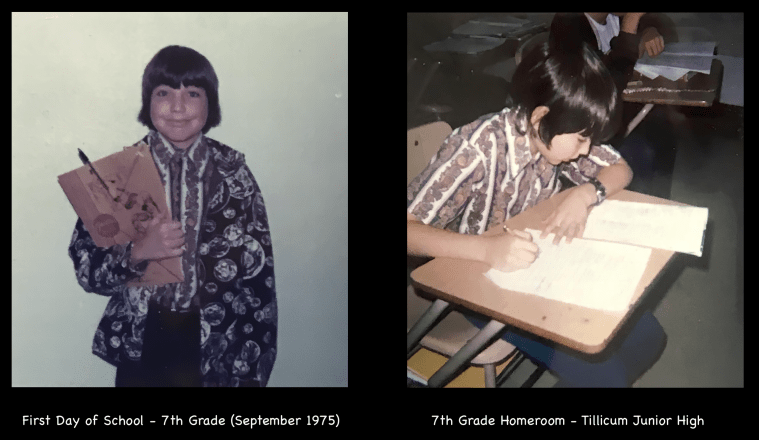
I’m pretty sure the picture on the left was taken on the first day of school in 1975, what would have been my first day of 7th grade and my very first day at Tillicum Junior High in Bellevue, WA. Stick with me while I do the math: if that was 1975 and this is 2025, well, that’s 50 years ago. By that calculation, I guess I’m now in the 57th grade, assuming I’ve not been held back (or skipped ahead, for that matter).
The picture on the right, I’m almost certain, was taken by Mrs. Martin, my 7th grade homeroom teacher. Homeroom meant having a teacher for two periods: Language Arts and Social Studies. As initially scheduled, those classes were back-to-back, periods 5 and 6 in the afternoon for me. But Tillicum had this quirky system where the class periods rotated. So depending on the day of the week, your morning classes would take place in the afternoon and vice versa. Looking back, I suppose it was meant to keep things “fresh,” maybe even based on some circadian-rhythm research. But to us kids, it mostly felt like an extra layer of confusion and stress, as if junior high didn’t already have enough of both. We’d just come from elementary school, where we basically stayed in one room with one teacher the whole day, to suddenly juggling seven classes in seven different rooms. Why not add in mixing up when the classes took place? Not to mention going to school with 9th graders, some who looked like the teachers?
So, yeah, I can just imagine the Tillicum administration saying something like, “Hey, let’s mix things up! On Tuesdays and Thursdays, we’ll put afternoon classes in the morning and morning classes in the afternoon. That ought to keep those kids sharp.”
Now, if you look closely at the picture on the right, you’ll see I’m wearing the same shirt I had on the first day of school. That makes me wonder if Mrs. Martin snapped the photo on the first day. Maybe… but I look like I’m working awfully hard for a first day, and the pencil I’m clutching is way too stubby to be a “first-day-of-school pencil,” if you know what I mean. So let’s assume it wasn’t taken on day one. That leaves us with two possibilities:
1) I really liked that shirt.
2) I only owned one shirt.
I really liked that shirt. 70’s paisley. Sign me up!
Speaking of clothes, the jacket I’m wearing in the picture on the left was handmade by my mom. She was super handy with her mint-green Singer sewing machine (which, if I remember correctly, my parents “bought” with Green Stamps back in the ’60s). The fabric design was Buffalo nickels. If you don’t know, a Buffalo nickel was a U.S. five-cent coin minted from 1913 to 1938. Since my family were collectors, we collected coins and getting a Buffalo nickel was kind of a big deal. We kept them and our other coins in those blue books where you’d press the coins into little round slots, all neatly organized by year. Half the fun was jamming the coin in without bending the cardboard. Remember those?
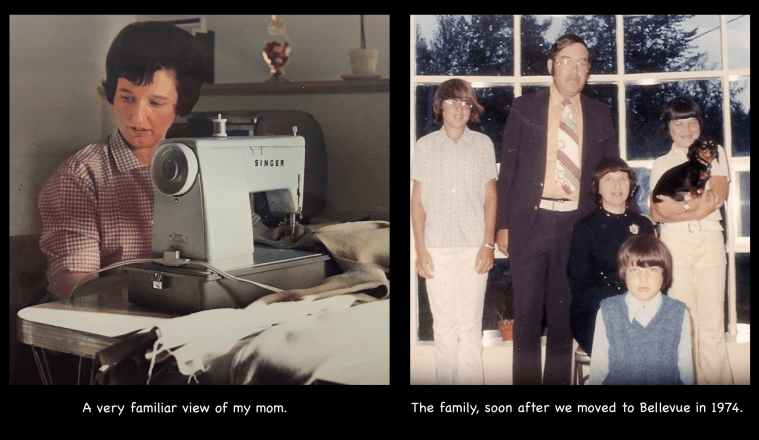
By the early ’70s, my brother Steve had become the main coin collector. I’d moved on to hockey cards, and our older brother Scott, well, we always said he just collected money. Not coins, not cards, just the kind you stick in a bank or invest. Steve eventually eased up on coin collecting, and I sold off my hockey cards in the early ’90s. Scott? He’s still doing a pretty good job collecting money.
You might be wondering why I’m wearing the Buffalo nickel jacket if Steve was the coin collector. Good question. The simple answer: Mom made the jacket for him. She’d sewn a hockey-themed one for me. By the time 7th grade rolled around and I needed a jacket, Steve had outgrown it, so it became a hand-me-down. Being the youngest of three boys, I got a lot of hand-me-downs. And, yes, I’m still waiting for my first “new” bike.
As for the Buffalo nickel fabric, I think Mom picked it up at a store in the old Eastgate Shopping Center in Bellevue, right next to the old Bellevue airport. The center had a Safeway where, fun fact, a pilot crashed his Cessna in 1976. There was also a drugstore called Fischer Drugs, a Dairy Queen, and I’m pretty sure a Fotomat (look it up!) in the middle of the parking lot. My dad bought his Racing Forms at a place called Lil’ Johns, and my brothers and I bowled at Sun Villa Lanes. Sometimes we even got our hair cut at Jerry’s Barbershop. Get this, Jerry was my mom’s first cousin!
I think the fabric store was called Wigwam, a name that hasn’t aged too gracefully (kind of like some old sports team names; for instance, the Seattle Mariners are playing the Cleveland Guardians as I write this – see the connection?). I liked going to Fischer Drugs as they had sports cards and candy. Wigwam, though, was a colossal bore for me back then. Add in that my mom could get lost looking at the fabric, and well, “Mom, can I go to Fischer’s and get some candy?”
Keep in mind that my dad was a candy salesman.

I think I’ve digressed. Let’s get back to 7th grade homeroom and Mrs. Martin. I really liked her as a teacher, even though she was a bit strict. I was the kind of student who could meet a teacher’s expectations, provided they were clear, and Mrs. Martin’s expectations were crystal clear. That said, I’ve been a certified teacher in Washington State for 35 years now and in retrospect, some of Mrs. Martin’s teaching strategies clash with a lot of the principles I’ve spent my career advocating.
For example, she used competition as a teaching tool, pitting classmates against each other. I remember us having spelling bees where she divided the class into two teams, one lining up on each side of the room. The person at the front of each line was given a word to spell. Spell it correctly, and you moved to the back of the line for your next turn. Spell it wrong, and you slunk back to your desk between the two lines, feeling the sting of public humiliation. The team with the last person standing was the winner
See what I mean by junior high school stress??
I was one of the last people standing during one of these epic battles and got knocked out on the word receipt. Yeah, I got the “I before E except after C” thing right, but I forgot the letter P. Give me a break, I was 12 years-old! Do YOU hear a P in the word receipt? Boy, was I humiliated when I returned to my seat, especially when a girl named Katie on the other team spelled receipt correctly. Game over. My cheeks burned.
I do have to give Mrs. Martin some credit, though. I’ve never misspelled “receipt” since that day. Not once. But seriously, at what price? Some lessons stick for life… and some stick with a little trauma attached.
As much as I think spelling bees like that are really bad teaching strategies (After all, who gets the most practice? The best spellers, of course.), Mrs. Martin did something else that was quite hard on me, specifically. For behavior management, she handed out demerits to misbehaving students. That might not sound so bad at first, though getting a demerit in front of your classmates could be pretty embarrassing. The real kicker? She didn’t keep track of them herself. Too busy teaching, she handed the job to a student.
And that student was me.
How would you like to be chosen by your homeroom teacher in 7th grade to keep tabs on your classmates? When a student distracted her or otherwise misbehaved in a way that Mrs. Martin deemed deserved a demerit, she’d turn her attention, and that of the class, to me. In a little notebook she had given me, I had to make a mark next to a kid’s name every time they got a demerit — four lines for four demerits, then a vertical line through them for the fifth, and then start over with the next group of five.
It never even occurred to me what would happen if I got a demerit. But you can bet I was on my best behavior to make sure it never happened.
I can still remember the kid who racked up the most demerits – Kurt (I’ll spare his last name for privacy, but yes, I remember it, too). Poor Kurt. So many blocks of five. It was almost like he was collecting demerits on purpose once he got started. I think many of them were for making funny noises, probably something he couldn’t control. Kurt had a talent for distraction, and apparently, for accumulating demerits.
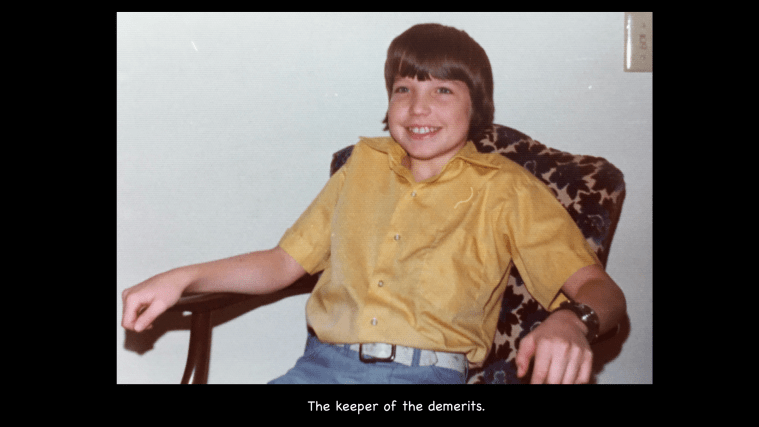
Here’s where the story takes a wild turn. Years later, after high school (Sammamish High, if you’re keeping score at home), Kurt went to Washington State University, the same university Melinda, my wife, attended. They were there at the same time, they knew each other, and yes, they even dated. Melinda says Kurt was her first serious boyfriend. Sadly, he passed away in 1984 while on an exchange program in Sweden.
Okay, enough of the sad stuff. Let’s lighten the mood. Back in high school, Kurt, I, and a few other friends went to see the Boomtown Rats (yes, that’s a band) in Seattle on St. Patrick’s Day, 1981. What a fun night! It started with a light dinner at Debbie’s apartment in North Seattle, Debbie being my brother Steve’s girlfriend (side note – on December 30th this year, which we’ve already established is 2025, Steve and Debbie, now Deb, will be celebrating their 43rd wedding anniversary). For us high schoolers, it was a big deal because Steve and Debbie were in college and had invited us over before the concert.
I don’t remember everyone who was there, but I know for sure it included my buddies John and Marc. Pretty sure Kevin and Bruce were there too, though don’t quote me on that. After the pre-concert dinner at Debbie’s, we carpooled to the Paramount, where the show was being recorded for future radio airplay. Bob Geldof, the lead singer and main songwriter for the Boomtown Rats, cued the audience at times to get the right crowd noise.
I don’t think Geldof gave any cues to John that made him throw up halfway through the show, which scattered a few rows of concert-goers. Could I blame it on something John had eaten at Debbie’s? Let’s be honest, it wasn’t what he had eaten. It was what he drank. Well, what he drank and how much, if you get my drift. It’s become one of those stories we tell over and over. And Kurt was there. I don’t recall him getting any demerits.
Here’s an interesting twist / digression: The reason Melinda and I even know each other is because she had learned you could make a surprising amount of money working at an Alaskan cannery over the summer, enough, maybe, to cover a year of college tuition. She and a friend found out through a classified ad, maybe in The Little Nickel (a pre-Internet Craig’s List – look that up, too). Later, at a party, another guest told her they had just overheard two guys talking about the same opportunity on a Metro bus.
Melinda looked into it, and in the summer of 1982, she had the “pleasure” of hacking up salmon to prepare it for canning (to this day, the smell of canned salmon is known to cause her to behave in a way that could scatter a few rows of concert-goers at a Boomtown Rats concert). She met Kevin and Bruce at the cannery that summer. Yes, THAT Kevin and THAT Bruce, two of the people who may or may not have been at the Boomtown Rats concert a year and half earlier. And by all accounts and as wild as this sounds, Kevin and Bruce were probably the two guys the party-goer overheard on the Metro bus.
In 1984, after Kurt passed away, Kevin and Bruce helped Melinda through the early stages of her grief. Around that time, she and I met at a party, though it wasn’t until 1990 that we became, shall we say, romantically involved. On December 31, 1990, we got married. Kevin and Bruce were our witnesses.

Can we all agree that it’s a crazy world — Buffalo nickel jackets, demerits, canned salmon, and all?
So, yeah, the picture of me on the left was taken on the first day of 7th grade in 1975. And I’m pretty sure the picture on the right was taken by Mrs. Martin, my 7th grade homeroom teacher.
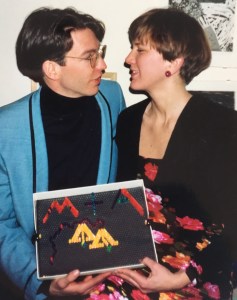

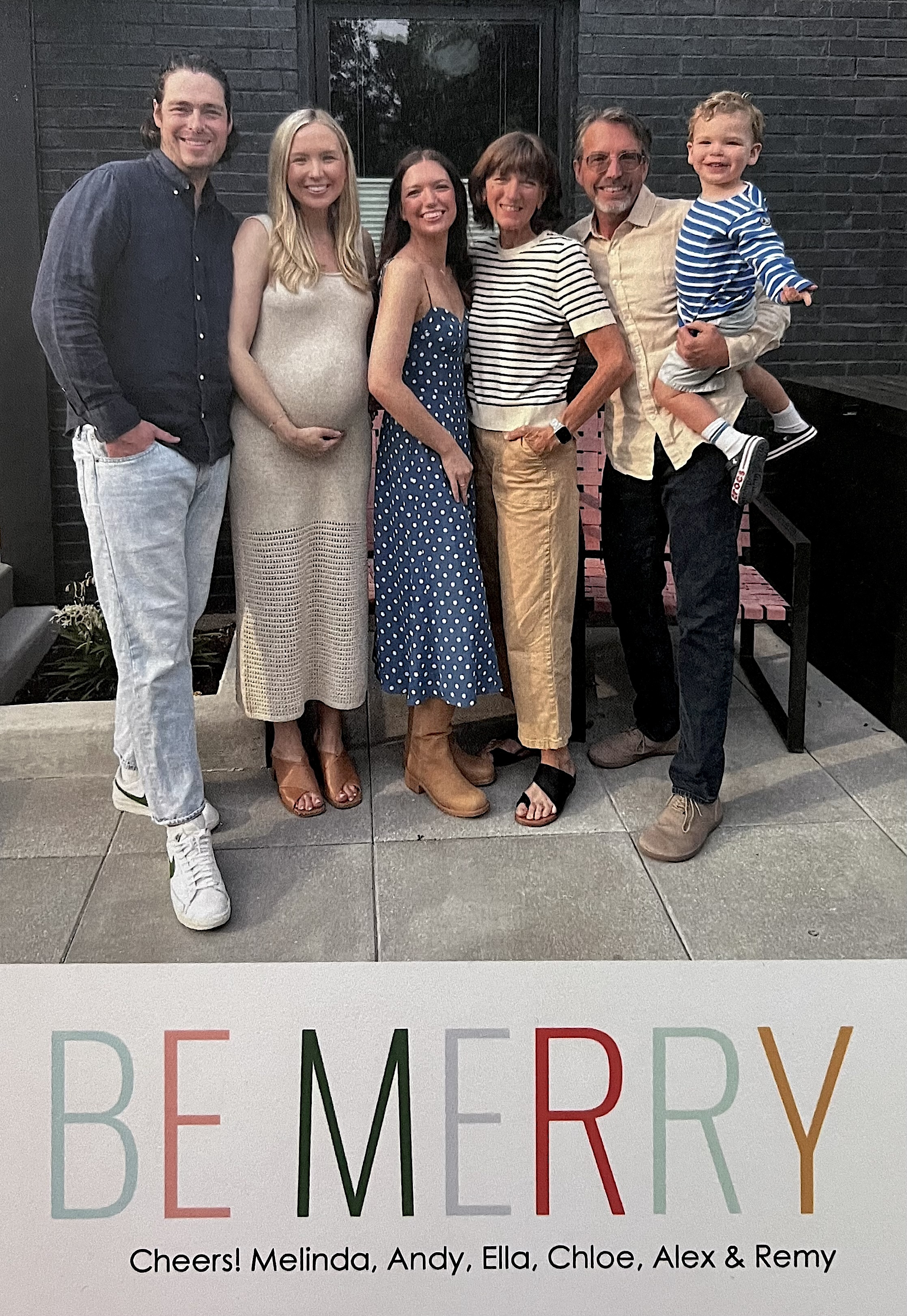
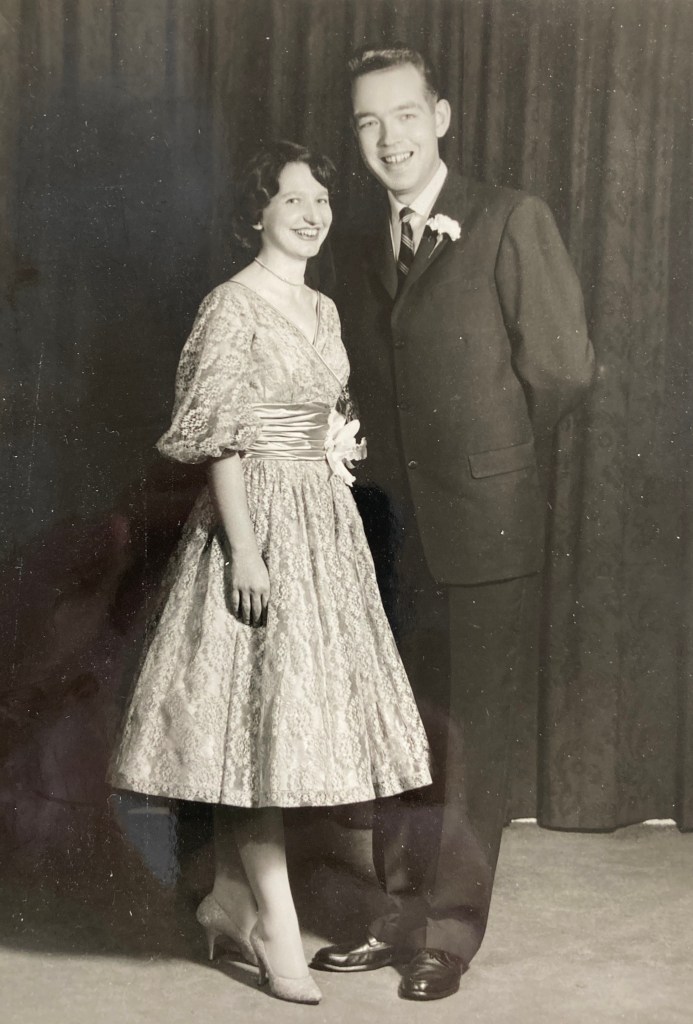


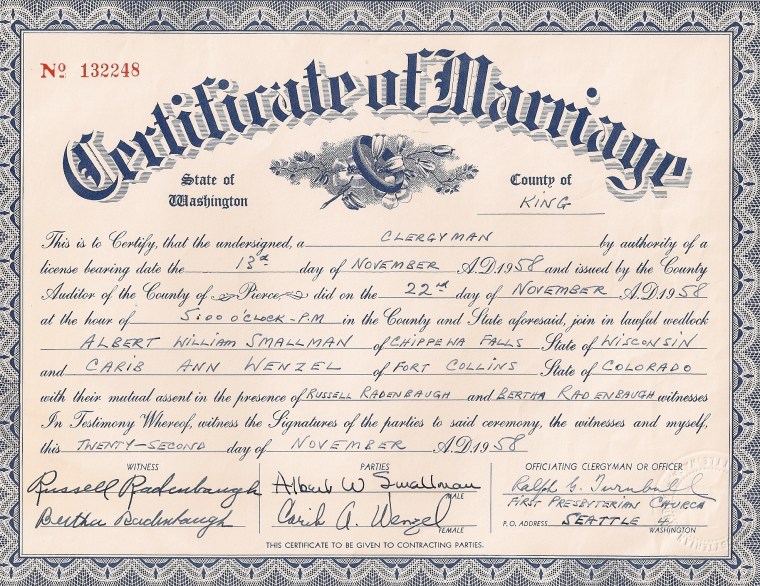
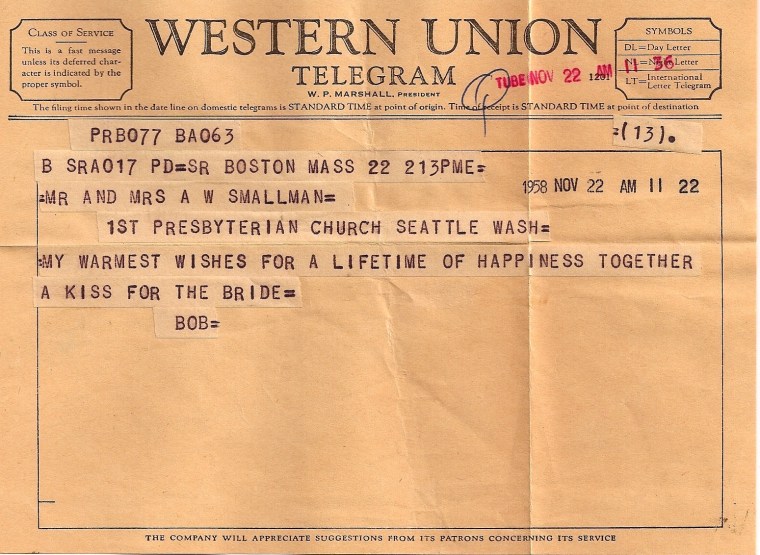










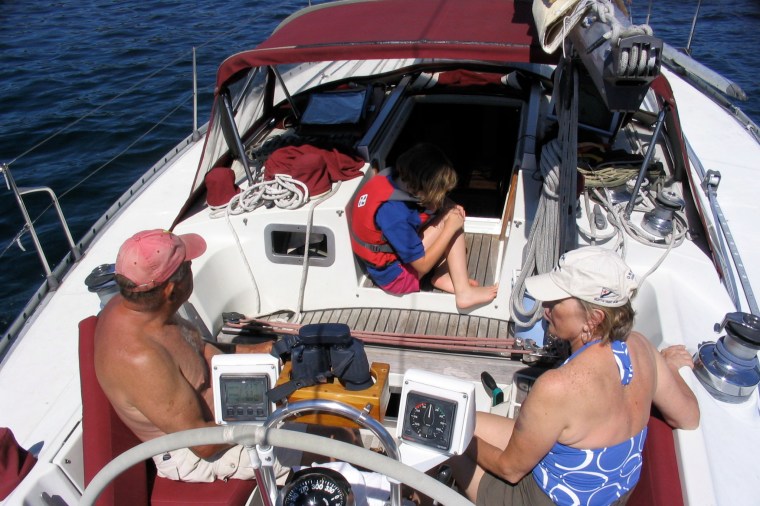

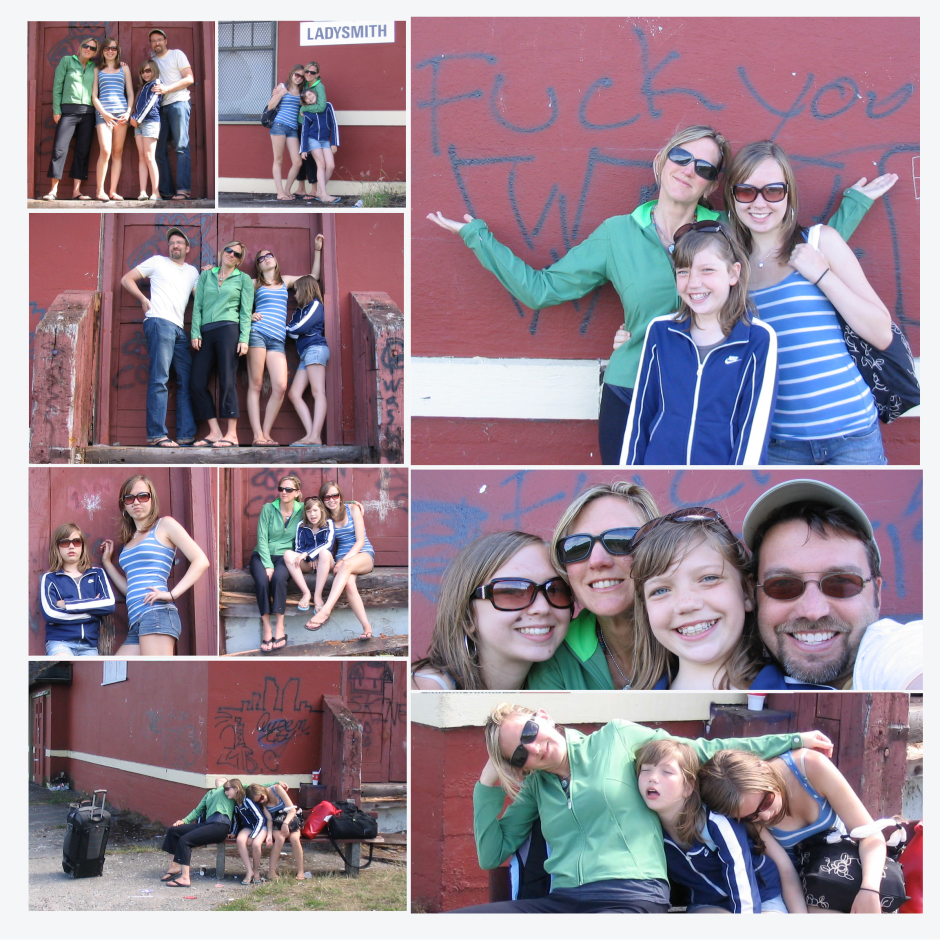



 A few years back, a quiet weekly reflection became something bigger than I expected. From 2018-2020, I translated each Tao Te Ching chapter into kindness-focused poems, sharing them on Facebook and on my
A few years back, a quiet weekly reflection became something bigger than I expected. From 2018-2020, I translated each Tao Te Ching chapter into kindness-focused poems, sharing them on Facebook and on my